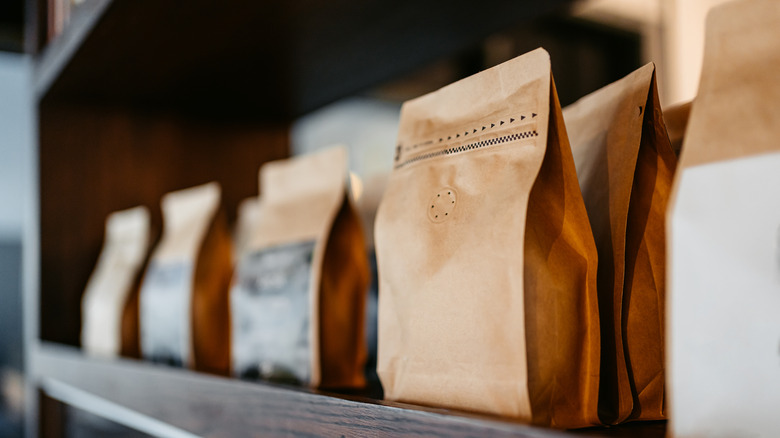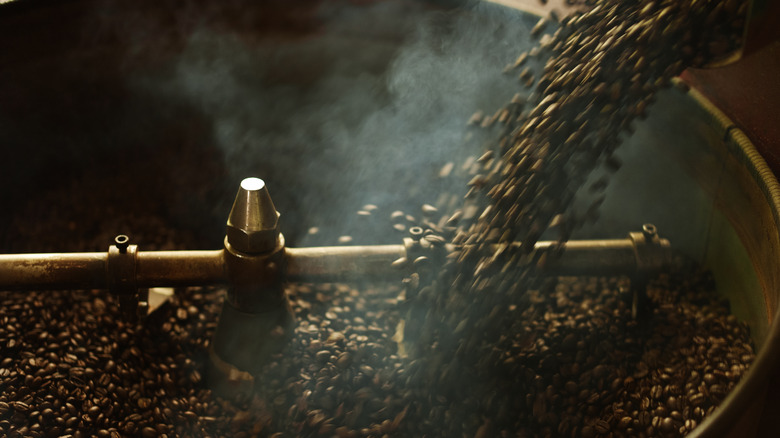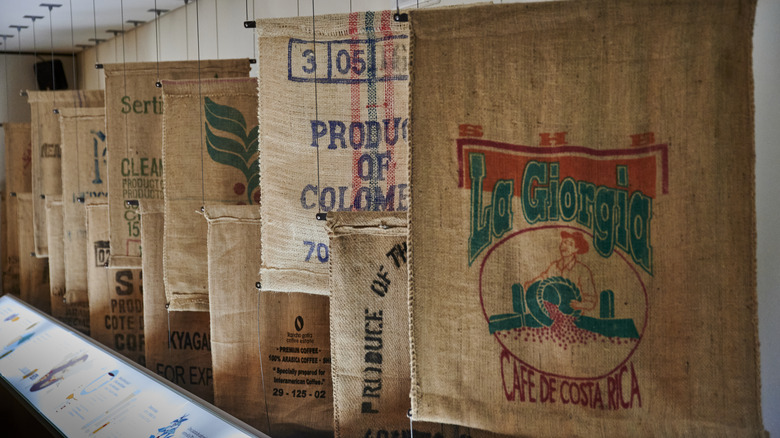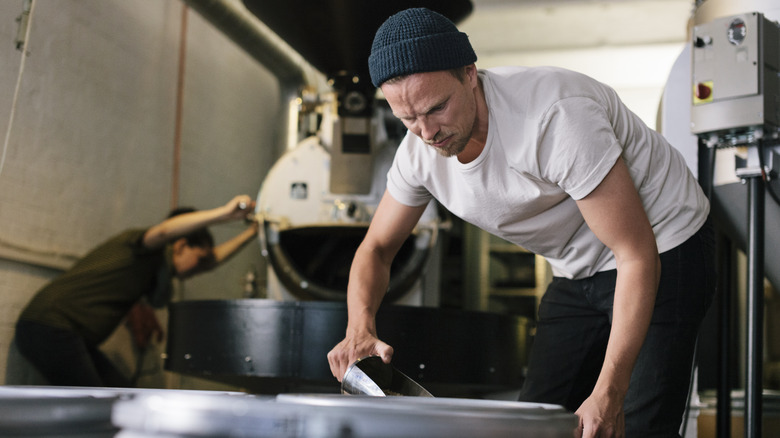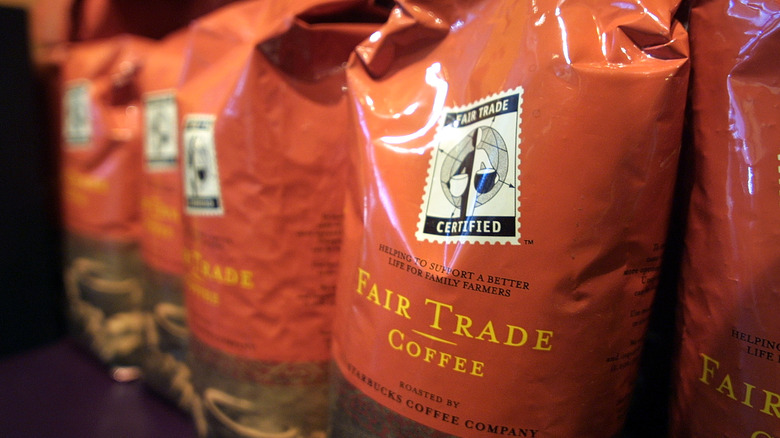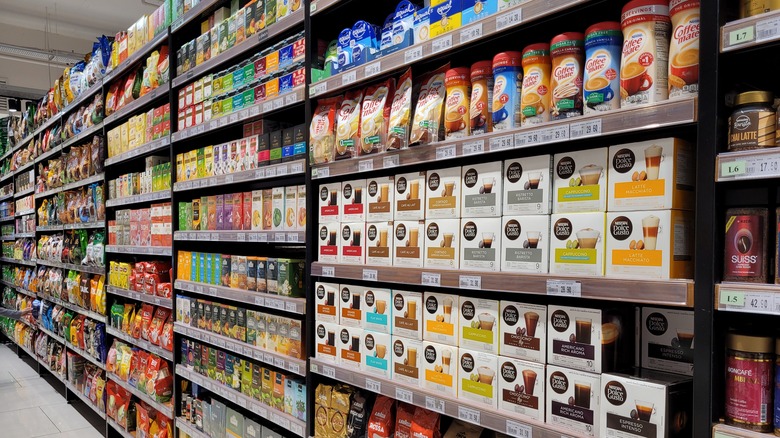The Expert Guide To Coffee Bean Labels
For many, coffee is an indispensable start to the day, but behind every cup there's a dizzying complexity. Global coffee growers are intertwined into an intricate supply chain that passes through suppliers and roasters before hitting the shelves. So when you're buying a bag for home brewing, it's enormously helpful to know what's inside. Thankfully, we have ex-barista Mathew Woodburn-Simmonds of Home Coffee Expert to help with navigating the info behind the symbols.
"There are a bunch of labels that are supposed to reassure you that the coffee has been ethically grown and purchased," he notes. Inspect a coffee bag and you'll see the harvest and slightly different roasting date, the process style, roasting type, bean source, certifications and more listed. Each descriptor reveals useful information, however it's good to know which to prioritize. For Woodburn-Simmonds, "roast date is the most important," as well as factors that signify the beans are sustainably produced. Combine such labels with a trusted roaster, and you'll be able to sift through what's worth purchasing.
Start by checking the coffee roast date
Like other foods and beverages, freshness is critical to coffee quality. You actually don't want coffee that's too fresh, as newly roasted beans are full of carbon dioxide, which need a few days to dissipate. Instead, roasters wait four days for peak flavor, and then vacuum seal their beans. After this, the coffee will very gradually turn stale, and, in point of fact, a certain amount of aging is beneficial. "You want your beans roasted around 12 to 14 days before you start using them," says Woodburn-Simmonds.
The specifics of the aging process vary based on the coffee, making it difficult to pinpoint exactly when a batch turns stale. An unopened bag will be safe to drink for as long as a year, although it won't taste as good by this point. Woodburn-Simmonds suggests " to avoid any beans that were roasted more than a month or two" prior to sale for the best flavor. Since even high quality beans won't taste great when old, the roast date should be the first label to check. And if it's missing a roast date altogether, pass on them — while the bag-yourself beans make the store smell great, that exposure to air and light translates to a poorer quality cup when you get them home.
Select coffee bags with detailed origin information
In addition to freshness, you'll want to search for even more comprehensive information on your bag. The origin info is valuable regarding general tasting notes; it'll lend you a loose idea regarding the robust acidity of Kenyan coffees as opposed to the clean and bright flavor of Costa Rican beans. However, Woodburn-Simmonds cautions that "there can be huge variation within countries and regions," so don't get in the habit of assuming all Brazilian coffee, for instance, will taste the same.
The more that's known about the origin, the greater the transparency about the producer, which is generally indicative of a high quality. "A coffee with a single farm origin is probably better than a single region which is probably better than a single country," says Woodburn-Simmonds. Such details aid in ensuring optimal flavor, since like other fruits, the harvest season differs based on the growing location. Plus, the scope of published information eludes that there's an established relationship between the roaster and farmer, with roasting conducted in a way that's tailored to the bean. While there are delicious blends that meld beans from different origins, it's more difficult to ascertain the quality based on the label.
Acquaint yourself with trustworthy roasters
Many steps go into coffee processing, with the minutiae all impacting the final cup. Yet the roasting step is especially crucial; it's what transforms raw green coffee into an aromatic and flavorful creation. So paying attention to the roaster on the label is worthwhile. "Buy from small roasters who know where the beans are from, have paid a fair price for them, and roasted them with care," says Woodburn-Simmonds.
Roasting is a delicate task that requires many years of experience to perfect. Lots of effort goes into not only matching the sourced coffee beans with their ideal temperature, but also achieving a roast in a specific style. For example, whether you're using an AeroPress — Alton Brown's go-to coffee gadget — or an espresso machine, you'll want to match your roast type with your brewing apparatus. So look for the roast degree on the label to make the most of your purchased beans.
Additionally, roasters typically purchase beans from producers or cooperatives, meaning they play a pivotal role in the sustainability of the coffee industry. Most coffee farms are small business operations, subject to volatile harvests and prices. Furthermore, the coffee industry grapples with a dark colonial past, predisposed to unfairly distributed profits. So supporting a reputable roaster endorses building beneficial business relations, which allows coffee farmers long-term success.
Become versed in reputable coffee certifications
There are other certifications you can look for on the package as well. Keep in mind many of these aren't guarantees of you'll like the taste, only that it meets certain regulatory or growing standards. As Woodburn-Simmonds notes, "It costs a lot of money to get certified, especially for things like USDA Organic, and some producers simply can't afford it, so the lack of this isn't necessarily a bad thing." Nevertheless, it's helpful to understand what each term means.
As in the food world, an organic label signifies a vigorous level of certification by the USDA, with frequent inspection. It's undoubtedly a respected and verified accreditation that showcases a commitment to no pesticides, crop rotation, and other ecological decisions. Just remember that some producers may have fit such criteria, but didn't apply for the certification.
Another prominent label is Fair Trade Certified™, which needs to appear exactly as spelled (it's sometimes forged). This accreditation targets market fluctuations, establishing a minimum selling price that must be adhered to. It's mostly designed for cooperatives, while also channeling funds to community initiatives. It's a respectable accreditation to see on a label, although our expert cautions it "has nothing to do with whether that money is fairly distributed to the workers."
Disregard labels like direct trade, which Woodburn-Simmonds notes "is a nice idea ... but legally its meaningless." And Shade grown is another such label that can be claimed by any producer. Meanwhile the Rainforest Alliance Certified™ label represents good practices, but for many isn't rigorous enough in its requirements.
Avoid big brand coffee
With the global growth of the specialty coffee industry, it's easier than ever to find bagged coffee that meets such requirements. However, this beverage market has also seen the rise of global conglomerates, with several brand names supplying retailers worldwide. Woodburn-Simmonds urges to pass on such corporate coffee initiatives, noting they engage in "massively overcharging you for the poor quality so they can enrich shareholders." He adds such coffees are usually overly roasted, and poorly sourced, thereby failing on several counts.
Expanding coffee to a corporate scale goes at odds with the production process. Around 75% of beans are grown on small farms, many of which are located in areas more vulnerable to economic and climatic pressures. There are threats of deforestation and water scarcity, making coffee vulnerable to climate change. Additionally, wage inequality and labor exploitation are unfortunately common in the industry, especially when large companies drive down prices. Corporate coffee conglomerates often neglect transparency, complicating the prospect of making an ethical purchase. So steer clear, and as much as possible, give your business to smaller operators who have a connection to trusted growers when purchasing bagged coffee.
